新标准英语第四册
小学新标准英语第四册
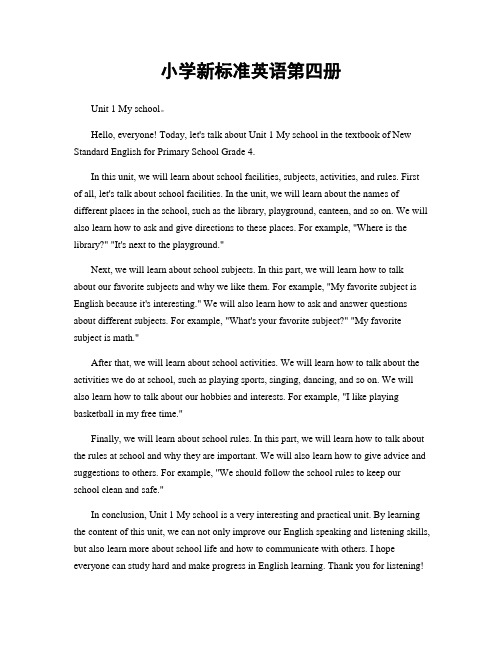
小学新标准英语第四册Unit 1 My school。
Hello, everyone! Today, let's talk about Unit 1 My school in the textbook of New Standard English for Primary School Grade 4.In this unit, we will learn about school facilities, subjects, activities, and rules. First of all, let's talk about school facilities. In the unit, we will learn about the names of different places in the school, such as the library, playground, canteen, and so on. We will also learn how to ask and give directions to these places. For example, "Where is the library?" "It's next to the playground."Next, we will learn about school subjects. In this part, we will learn how to talk about our favorite subjects and why we like them. For example, "My favorite subject is English because it's interesting." We will also learn how to ask and answer questions about different subjects. For example, "What's your favorite subject?" "My favorite subject is math."After that, we will learn about school activities. We will learn how to talk about the activities we do at school, such as playing sports, singing, dancing, and so on. We will also learn how to talk about our hobbies and interests. For example, "I like playing basketball in my free time."Finally, we will learn about school rules. In this part, we will learn how to talk about the rules at school and why they are important. We will also learn how to give advice and suggestions to others. For example, "We should follow the school rules to keep our school clean and safe."In conclusion, Unit 1 My school is a very interesting and practical unit. By learning the content of this unit, we can not only improve our English speaking and listening skills, but also learn more about school life and how to communicate with others. I hope everyone can study hard and make progress in English learning. Thank you for listening!。
新标准大学英语第四册综合教程课后翻译—Translation

Translation
“A lot of the debates people have about money are code for how we want to live our lives,” said Betsey Stevenson, assistant professor of business and public policy at the University of Pennsylvania’s Wharton School, who researches the economics of marriage and divorce. “A lot of the choices we make in how we want to live our lives involve how we spend our money.”
Although I was not a man who would easily bow to fate, as the summer break came to a close, I decided to give up economics for fear that I would fail in both subjects. Now that I had only one subject to attend to, everything seemed to be on the right track again.
Back
Active reading 2: Resources
Translation
Translate the paragraphs into Chinese.
Today, while most of us marry for romantic reasons, marriage at its core is still a financial union. So much of what we want – or don’t want – out of life boils down to dollars and cents, whether it’s how hard we choose to work, how much we consume or how much we save.
新标准大学英语第四册第1课
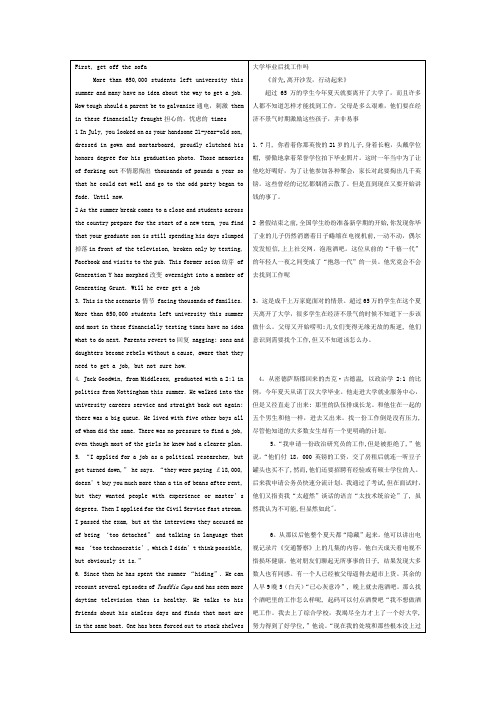
12 paying for careerconsultations, train fares tointerviews or books are good things; being too pushy is not.But while parents should be wary of becoming too soft, Lindenfield advises them to tread踩sympathetically after a job setback for a few days or even weeks–depending on the scale of the knock.After that the son or daughter needs to be nudged推动firmlybackinto the saddle.
10. Gael Lindenfield, a psychotherapist and the author of the Emotional Healing Strategy, says that the Goodwin parents have struck exactly the right note.The transition from university to a job is tough for parents and children: Crucially they must balance being positive and understanding with not making lifheir offspring.
新标准大学英语第四册unit1教案
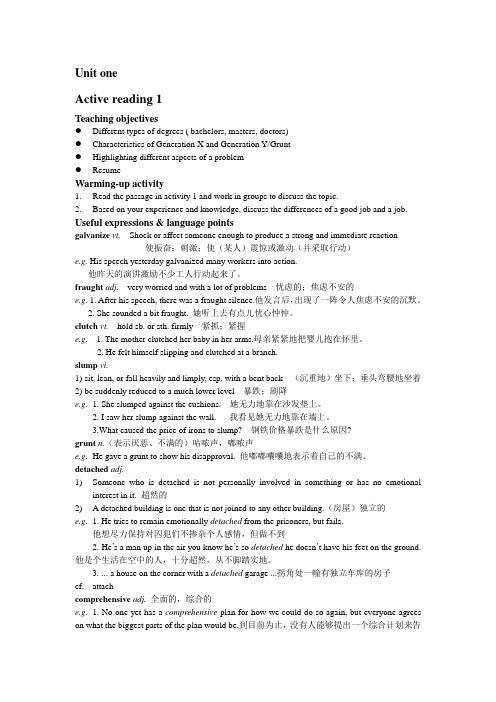
Unit oneActive reading 1Teaching objectives●Different types of degrees ( bachelors, masters, doctors)●Characteristics of Generation X and Generation Y/Grunt●Highlighting different aspects of a problem●ResumeWarming-up activity1.Read the passage in activity 1 and work in groups to discuss the topic.2.Based on your experience and knowledge, discuss the differences of a good job and a job. Useful expressions & language pointsgalvanize vt.Shock or affect someone enough to produce a strong and immediate reaction使振奋;刺激;使(某人)震惊或激动(并采取行动)e.g. His speech yesterday galvanized many workers into action.他昨天的演讲激励不少工人行动起来了。
fraught adj.very worried and with a lot of problems 忧虑的;焦虑不安的e.g. 1. After his speech, there was a fraught silence.他发言后,出现了一阵令人焦虑不安的沉默。
2. She sounded a bit fraught. 她听上去有点儿忧心忡忡。
clutch vt.hold sb. or sth. firmly 紧抓;紧握e.g. 1. The mother clutched her baby in her arms.母亲紧紧地把婴儿抱在怀里。
新标准大学英语第四册第二单元第一篇课文

Neglect: fail. He was so busy that he neglected his health. 他忙得连身体健康都无法顾及。 He was dismissed for neglecting his duty. 他因玩忽职守而被解雇。 Extent: degree
读书让我们能够安全地享受和庆贺这种 Reading books allows to enjoy and celebrate this variety 变化与差异,并为我们提供成长的机会。 and differences in safety, and provides us with an 在家里安详平和的环境中与他人的生活 opportunity to grow. To interact with other people’s lives
In what senses does reading liberate us from the real world? In books we can do all sorts of wonderful or interesting things which would be impossible in the real world.
英国诗人威廉·柯珀(1731–1800)说: The English poet William Cowper (1731-1800) said “变化是生活的调味品,它让生活变得 “Variety’s the very spice of life, /That gives it all its 有滋有味。”虽 然他没有说在什么地方 flavor” although he neglected to say where or how we 以及怎样才能找到变化,但我们知道他 could find it. But we know he was right. We know we live 说得对。我们知道我们生活在一个充满 in a world of variety and difference. We know that people 变化与差异的世界里,我们知道人们的 live various different lives, spend their time in various 生活各不相同,过日子的方式也不尽不 different ways, have different jobs, believe in different 同,人们做不同的工作,有不同的信仰, things, have different opinions, different customs, and
新标准大学英语第四册第一单元课文原文及翻译表格格式
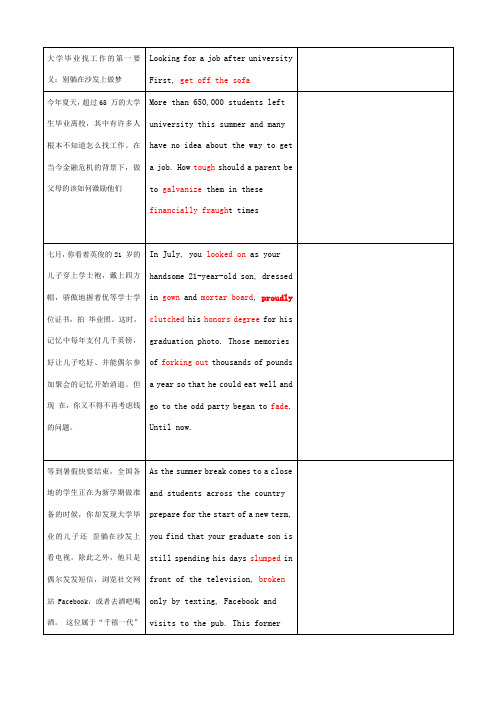
大学毕业找工作的第一要义:别躺在沙发上做梦
Looking for a job after university First,get off the sofa
新标准英语(第四册课文文本及单词表

新标准英语(第四册课文文本及单词表篇一:一年级起新标准英语第四册课文文本新标准英语(一年级起)第四册课文文本module1unit1what’stheweatherlike?comeon,Amy.Let’sgotothepark!what’stheweatherlike?It’shot.Andit’ssunny.Let’stakeourhats.where’smyhat?It’soverthere.It’sonthesofa.(Inthestreet)It’swindynow.oh,no!myhat!hereitis,Amy!Thankyou,sam.ohno!It’srainingnow.oh,sorry!Look.It’sDaming.module1unit2Ilikeswimming.what’stheweatherlikehereinsummer?It’shot whatdoyoulikedoinginsummer?Ilikeswimming.what’stheweatherlikehereinwinter?It’scoldanditsnows. whatdoyoulikedoinginwindow?Ilikeskiing.poem(小诗):It’shot.It’scold.It’shot.It’scold.Andit’sraining,too.It’ssunny.Andit’swindy.wedon’tknowwhattodo.It’shot.It’scold.It’shot.It’scold.Andit’sraining,too.It’ssunny.Andit’swindy.Isthisweathertrue?module2unit1she’slisteningtotheradioLookatmyphotos,sam.That’syourmother.Yes,itis.she’slisteningtotheradio.Andthat’syourfather.Yes,itis.Look.he’sreadinganewspaper.ohyes!Tom’splayingwithhistrain.Andthisisyourlittlebrother.Andthisismynewcamera.s mile,please!module2unit2I’mdrawingapicture.hi.I’mbecky.I’meight.I’mwritingaletter.AndI’mdrawingapicture.I’mcolouringthepicture.It’sformyfriendFangfanginchina.Doyoulikeit?song(歌曲):I’mlisteningtomusic.I’mreadingabook.I’ehereandlook.I’mplayingfootball.I’mtalkingtoyou.I’mdoingmyhomework.Areyoudoingit,too?module3unit1samisn’ttidyinghisroom.sam,pleasedoyourhomework!Andtidyyourroom!mum,samisn’ttidyinghisroom.Ishedoinghishomework?no,heisn’t. what’shedoing?It’sasecret.Asecret?sam,whatareyoudoing? Thisisforyou,mum.happybirthday!Abirthdaycard!Thankyou,sam! Areyoutidyingyourroomnow?Yes,Iam.goodboy.module3unit2Areyoudoingyourhomework? Areyoudoingyourhomework,Amy?Yes,mum.Amy,you’redrawingapicture!You’renotdoingyourhomework!mum,I’mdrawingapictureofflowers.It’smysciencehomeworktoday! poem(小诗):Areyoudoingyourhomework?Areyoulisteningtomusic? Areyoutidyingyourroom?Areyoureadingabook? Areyoudrawingapicture?AreyouwatchingTV?I’mcomingtoyourroom.I’mcomingtoyou.module4unit1whatareyoudoing?hi,Amy.hi,Lingling.what’sthatnoise?Areyoudrinking?no,I’mnot. Areyoueating?no,I’mnoteating.sowhatareyoudoing?I’mtalkingtoyou.Andwhat’thatnoise?oh,thatnoise!It’sTom.what’shedoing?he’splayingwithhistrain.module4unit2what’shedoing?where’sLingling,Daming?she’sthere.what’sshedoing?she’splayingagamewithAmyandsam.whatgamearetheyplaying?They’replayingfive-stones.poem(小诗):whatareyoudoing?we’reverylate.hurryup!hurryup!pleasefinishyourcake!whatareyoudoing?pleas eputonyourshoes!hurryup!hurryup!There’snotimetolose.module5unit1Linglingisskipping.(It’splayingtime)Fangfang,areyousad?Yes,nooneisplayingwithme.Linglingisskipping.Dami ngandsamareplayinghide-and-seek,DamingishidingandDamisseeking.Thosegirlsareplayingclappinggames.Doyoulikeclappinggames?Yes,Ido. well,let’splayclappinggamestogether!one,two,three,four.Iamopeningthedoor.Five, six,seven,eight.hurryup!Don’tbelate.module5unit2whatareyouplaying?whatareyouplaying?we’replayingcatch.Thegirlsarerunning. Theboysarecatchingthem.canIplaywithyou?Yes,youcan.poem(小诗):we’replayingintheplayground.somearerunningraces.we’rehavinglotsoffun.someareplayingcatch. Runningandskippingtogether,everyone.someareplayingfootballtogetherin amatch.module6unit1Iusuallyplaybasketball.onsundays,Iusuallyplaybasketball.It’ssundaytoday.buthe’snotplayingbasketball.Iusuallyhelpmyfather.buthe’snothelpingmetoday. Iusuallyridemybike.buthe’snotridingittoday. AndIsusallydomyhomework.he’snotdoinghishomeworknow. Todayhe’snotdoingthesethings.he’sinbed.he’sill.butIamwatchingTV. module6unit2wearehelpingher.mygrandmausuallycooks.Andsheusuallygoesshopping.buttodaysheisn’tdoingthesethings.TodayIamcooking.Andmyfatherisgoingshopping.Today isgrandma’sbirthday.Todayisgrandma’sbirthdayandwearehelpingher.module7unit1It’schildren’sDaytoday.goodmorning.boysandgirls.I’mxiaohufromschoolTV.It’schildren’sDaytoday.Look.Thechildrenareveryhappy.Damingisdoingaplaywithsome children.Linglingissingingasong.samissayingapoem.Amyisdancing.now,look.childrenfromclass2arecoming.They’redoingadragondance. module7unit2we’rehavingapicnic.myname’sTingting.I’mattheparkwithmyfamily.we’rehavingapicnic.myfatherisflyingakite.mymotheriseating.Andmygrandma issleeping.Iamdrawingapicture.Theweatherisgood.Itissunnyandwarm. song(歌曲):It’schildren’sDay.Let’splay!Let’splay!It’schildren’sDaytoday.It’schildren’sDay.I’mhappytosayit’schildren’sDaytoday.module8unit1Thetrainisgoingupahill.hello.I’monthetrainnow.good,I’matthestation. Thetrainisgoingupahill.nowit’sgoingdownahill.now,it’sgoingpastahospital.nowit’sstoppingatthestation.Icanseeyou!AndIcanseeyou,too!module8unit2we’returningaroundwe’regoingup.we’regoingdown.we’returningaround.we’retouchingthesky.we’retouchingtheground.Andhowwe’returningaroundagain.song(歌曲):shake,shake,shakeyourshoulders.shakethemupanddown.shake,shake,shakeyourshoeandstampitontheground.module9unit1Turnleft!whatareyougoing,sam?I’mgoingtoDaming’sflat.whereisit?It’sinwestLakeRoad.excuseme.where’swestLakeRoad.gostraighton!Thenturnright! Thenturnleft!Thankyou!You’rewelcome.Daming,I’mlost! whereareyou?I’minwestLakeRoad.IliveineastLakeRoad.notwestLakeRoad.module9unit2 wheredoyoulive?wheredoyoulive?IliveIApplestreet.AndwhereisApplestreet? gooutoftheschool.Turnleft.Thengostraighton.Yougopastthefactory. Thenyouturnright.ThatisApplestreet.poem(小诗):Leftfoot,rightfoot,Leftfoot,right.marchingallday,andmarchingallnight.gost raighton,nowturnright.Leftfoot,rightfoot,leftfoot,right.unit10unit1It’snexttothepark.sam,thisismycousinLin.nicetomeetyou.nicetomeetyou,too.excuseme.wher e’sthesupermarket,please?gostraighton.Thenturnleft.It’snexttothepark.excuseme,where’sthezoo?gostraighton.It’sinfrontoftheschool. Youknowthecitywell,Lin.ofcourse!I’mataxidriver!ha,ha,ha.unit10unit2where’sthetoilet,please? excuseme.where’sthetoilet,please?Thegirlstoiletisoverthere,ontheleft.Theboy’stoiletisontheright.Thankyou.You’rewelcome.poem(小诗);Lookleft,lookright,lookleft,again.Acariscoming.sostartagain.Lookleft,loo kright,thenlookleft,now.nothingiscoming.Let’scrossnow.篇二:一年级起新标准英语第五册课文文本及单词表module1use使用chopsticks筷子hard困难的people人们knife刀fork叉easy容易的hamburger汉堡包chips薯条fastfood快餐module2make制作cake蛋糕idea主意instead代替lovely可爱的module3naughty淘气的dragonboat龙舟row划船lake湖feed喂getout离开wet湿的shorts短裤module4can能winner胜利者jump跳far远see看出,发觉module5shop商店ill生病的biscuit饼干worry担心all全部的module6computergame电子游戏机careful小心的fix修理jigsawpuzzle拼图玩。
新标准大学英语综合教程4课后翻译U1--U8
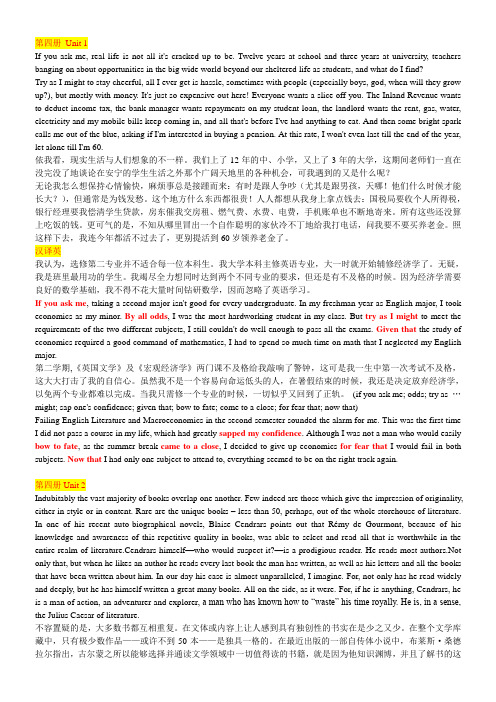
第四册Unit 1If you ask me, real life is not all it's cracked up to be. Twelve years at school and three years at university, teachers banging on about opportunities in the big wide world beyond our sheltered life as students, and what do I find?Try as I might to stay cheerful, all I ever get is hassle, sometimes with people (especially boys, god, when will they grow up?), but mostly with money. It's just so expensive out here! Everyone wants a slice off you. The Inland Revenue wants to deduct income tax, the bank manager wants repayments on my student loan, the landlord wants the rent, gas, water, electricity and my mobile bills keep coming in, and all that's before I've had anything to eat. And then some bright spark calls me out of the blue, asking if I'm interested in buying a pension. At this rate, I won't even last till the end of the year, let alone till I'm 60.依我看,现实生活与人们想象的不一样。
新标准大学英语综合教程4(unit1-6)课后答案及课文翻译
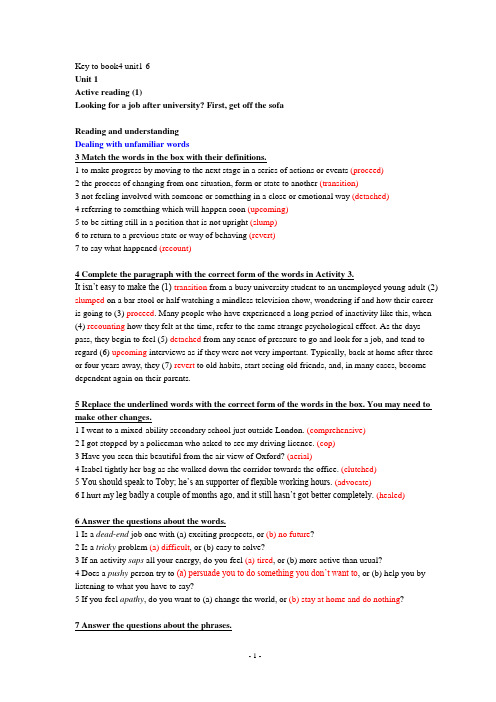
Key to book4 unit1-6Unit 1Active reading (1)Looking for a job after university? First, get off the sofaReading and understandingDealing with unfamiliar words3 Match the words in the box with their definitions.1 to make progress by moving to the next stage in a series of actions or events (proceed)2 the process of changing from one situation, form or state to another (transition)3 not feeling involved with someone or something in a close or emotional way (detached)4 referring to something which will happen soon (upcoming)5 to be sitting still in a position that is not upright (slump)6 to return to a previous state or way of behaving (revert)7 to say what happened (recount)4 Complete the paragraph with the correct form of the words in Activity 3.It isn‘t easy to make the (1) transition from a busy university student to an unemployed young adult (2) slumped on a bar stool or half watching a mindless television show, wondering if and how their career is going to (3) proceed. Many people who have experienced a long period of inactivity like this, when (4) recounting how they felt at the time, refer to the same strange psychological effect. As the days pass, they begin to feel (5) detached from any sense of pressure to go and look for a job, and tend to regard (6) upcoming interviews as if they were not very important. Typically, back at home after three or four years away, they (7) revert to old habits, start seeing old friends, and, in many cases, become dependent again on their parents.5 Replace the underlined words with the correct form of the words in the box. You may need to make other changes.1 I went to a mixed-ability secondary school just outside London. (comprehensive)2 I got stopped by a policeman who asked to see my driving licence. (cop)3 Have you seen this beautiful from the air view of Oxford? (aerial)4 Isabel tightly her bag as she walked down the corridor towards the office. (clutched)5 You should speak to Toby; he‘s an supporter of flexible working hours. (advocate)6 I hurt m y leg badly a couple of months ago, and it still hasn‘t got better completely. (healed)6 Answer the questions about the words.1 Is a dead-end job one with (a) exciting prospects, or (b) no future?2 Is a tricky problem (a) difficult, or (b) easy to solve?3 If an activity saps all your energy, do you feel (a) tired, or (b) more active than usual?4 Does a pushy person try to (a) persuade you to do something you don‘t want to, or (b) help you by listening to what you have to say?5 If you feel apathy, do you want to (a) change the world, or (b) stay at home and do nothing?7 Answer the questions about the phrases.1 Is fork out (a) a formal, or (b) an informal way of saying to pay for something?2 If you are in the same boat as another person, are you (a) making the same journey together, or (b) in the same difficult or unpleasant situation?3 If you feel you have come full circle, do you (a) feel you are back where you started, or (b) feel a sense of satisfaction because you have completed something?4 If someone takes a soft line, do they deal with a person (a) in a kind and sympathetic way, or (b) in a lazy way without making a decision?5 If you strike the right note about something, are you expressing yourself (a) well, or (b) badly?6 If you do something by all means, do you (a) try your best to do it, or (b) not care about it?7 If you nudge someone back into the saddle, are you encouraging them to (a) take responsibility again, or (b) take it easy?8 If you talk through a problem with someone, do you (a) examine it carefully and sensitively, or (b) refer to it quickly and then change the subject?Active reading (2)If you ask meDealing with unfamiliar words4 Match the words in the box with their definitions.1 funny or entertaining (amusing)2 used for emphasizing that something good has happened, especially because of good luck (fortunately)3 an amount of money that a person, business or country borrows, usually from a bank (loan)4 to take an amount or number from a total (deduct)5 the most exciting, impressive, or interesting part of an event (highlight)6 to show that you understand someone‘s problems (sympathize)7 needing a lot of time, ability, and energy (demanding)5 Complete the conversation with the correct form of the words in Activity 4.A After three years at university, I‘m now quite heavily in debt.B I (1) sympathize with you, I know what it‘s like to have financial problems. But (2) fortunately I didn‘t need to take out a student (3) loan when I was at university, because I had a part-time job.A What did you do?B I worked in a restaurant at weekends.A That must have been very (4) demanding.B Yes, it was. I had to get the right balance between work and study. But the other people who worked there were good fun to be with, so it was quite (5) amusing too. The (6) highlight of the weekend was always Saturday night when we worked overtime.A But I don‘t expect you made a lot of money?B No, there wasn‘t much after they‘d (7) deducted tax and pension contributions. But it was enough to keep me going.6 Replace the underlined words with the correct form of the words in the box. You may need to make other changes.1 When I was at college I kept all my personal things in an old cupboard.2 A lot of people who leave university before getting a degree end up in good jobs.3 I think she‘ll get a good degree, but I wouldn‘t risk my money on the exact result.4 The money I spent at college was more than what I earned in my part-time job.5 The chances of my being offered a job after that interview must be quite remote.6 Our business has done very well since we changed our advertising.7 I think telling the truth and not cheating is always the best policy.Key:(1) belongings (2) dropouts (3) gamble (4) exceeded (5) odds(6) has thrived (7) honesty7 Answer the questions about the words and expressions.1 If something is not all it’s cracked up to be, is it (a) valid and interesting, or (b) just a little bit disappointing?2 If someone keeps banging on about something, are you likely to be (a) interested in, or (b) bored by what they say?3 If there is a lot of hassle in your life, are you likely to feel (a) stressed, or (b) relaxed?4 If something happens out of the blue, is it (a) unexpected, or (b) part of your plan?5 If you say you ended up in a particular job, do you suggest that (a) you have fulfilled your ambition, or (b) it happened almost by chance?6 Are the regulars in a pub (a) the customers who come very often, or (b) the food the pub offers most often?7 If something is dead easy, is it (a) very easy, or (b) not easy at all?8 If you treat someone to something, do you (a) buy something nice for them, or (b) behave badly to them?9 If you cheer a place up, do you (a) make the place look brighter, or (b) make the people in the place happier?Reading and interpreting8 Look at the sentences from the passage and identify the style features.1 Twelve years at school and three years at university, teachers banging on about opportunities in the big wide world beyond our sheltered life as students, and what do I find?This shows the informality of an incomplete sentence in the first part, the use of an informal expression (banging on) and a rhetorical question to the reader (What do I find?)2 Try as I might to stay cheerful, all I ever get is hassle, sometimes with people (especially boys, god, when will they grow up?) …This has the use of an informal word (hassle), an informal exclamation (god) and a question to the reader (When will they grow up?)3 Actually, I had my eye on the course at the London School of Economics (LSE).Here there is a discourse marker typical of speech (Actually) and an informal phrase (had my eye on).4 I kind of understand it, and not just because my degree is in economics.Here ―kind of‖ is a sort of discourse marker of informal speech (showing something is general, vague or not definite).5 I wanted something in finance and investments, because you know, maybe with a job like that, Icould use my degree.This has a discourse marker of informal speech (you know).6 ... it‘s true, he really did seem to have three hands.Again here is a discourse marker of informal speech (it‘s true).7 I talked to him about ... well, about pretty well everything …This has another discourse marker of informal speech (well) and an informal phrase (pretty well). Language in useword formation: compound nouns1 Write the compound nouns which mean:1 a degree which is awarded a first class (a first-class degree)2 work in a hospital (hospital work)3 a ticket for a plane journey (a plane ticket)4 a discount for students (a student discount)5 a pass which allows you to travel on buses (a bus pass)6 a room where an interview is held (an interview room)7 a period spent in training (a training period)word formation: noun phrases2 Write the noun phrases which mean:1 a career which is rewarding from the financial point of view (a financially rewarding career)2 legislation which has been introduced recently (recently introduced legislation)3 instructions which are more complex than usual (unusually complex instructions)4 an institution which is orientated towards academic (academically orientated work)5 work which makes physical demands on you (physically demanding work)6 information which has the potential to be important (potentially important information)7 candidates who have been selected after a careful procedure (carefully selected candidates)8 a coursebook in which everything has been planned beautifully (a beautifully planned textbook)try as … might3 Rewrite the sent ences using try as … might .1 I‘m trying to fill this last page, but I just can‘t think of anything.Try as I might to fill this last page, I just can‘t think of anything.2 I try to be friendly with Marta, but she doesn‘t seem to respond.Try as I might to be friendly with Marta, she doesn‘t seem to respond.3 I try hard to get to sleep, but I can‘t help thinking about my family.Try as I might to get to sleep, I can‘t help thinking about my family.4 He just doesn‘t seem to get the promotion he deserves, even though he keeps trying.Try as he might, he just doesn‘t seem to get the promotion he deserves. / Try as he might to get the promotion he deserves, he just doesn‘t seem to get it.5 I keep trying to remember her name, but my mind is a blank.Try as I might to remember her name, my mind is a blank.given that …4 Rewrite the sentences using given that …1 Since I know several languages, I thought I would look for work abroad.Given that I know several languages, I thought I would look for work abroad.2 Xiao Li has the best qualifications, so she should get the job.Given that Xiao Li has the best qualifications, she should get the job.3 Since we‘re all here, I think it would be a good idea to get down to some work.Given that we‘re all here, I think it would be a good idea to get down to some work.4 Since it‘s rather late, I think we should leave this last task until tomorrow.Given that it‘s rather late, I think we should leave this last task until tomorrow.clauses introduced by than5 Rewrite the sentences using clauses introduced by than .1 She‘s experienced at giving advice. I‘m more experienced.She‘s less experienced at giving advice than I am. / I‘m more experienced at giving advice than she is.2 You eat too much chocolate. It isn‘t good fo r you.You eat too much chocolate than is good for you.3 She worked very hard. Most part-timers don‘t work so hard.She worked harder than most part-timers do.4 You have arrived late too many times. That isn‘t acceptable.You have arrived late more times than is acceptable.5 I don‘t think you should have given so much personal information. It isn‘t wise.I think you have given more personal information than is wise.collocations6 Read the explanations of the words. Answer the questions.1 highlight A highlight is the most exciting, impressive, or interesting part of an event.(a) What would you like to be the highlight of your career?I would like the highlight of my student career to be to receive a national award for the best student research project.(b) How can you highlight an important sentence in a text?You can underline it in pencil or pen or you can use coloured pens or highlighters.(c) What are the edited highlights of a football match?The highlights are when someone scores a goal or prevents one from being scored.2 loan A loan is an amount of money someone borrows from someone else.(a) Have you ever taken out a loan?No, I haven‘t. But my parents have taken out several loans to buy kitchen equipment.(b) What is the best way to pay off a loan?It is best to pay a loan off quickly, although you will still have to pay some interest.(c) If you have a library book on loan, what do you have to do with it?You have to return it before the date it is due, otherwise you may have to pay a fine.3 thrive To thrive means to be very successful, happy or healthy.(a) What sort of business thrives best in your part of the country?In my part of the country, light industries and electronics companies thrive.(b) Which sort of plants thrive in a hot climate?In a hot climate you can see tropical fruit and vegetables thrive and also tropical plants and trees. (c) Why do you think some couples thrive on conflict?It is difficult to understand why some couples thrive on conflict. Maybe each one wants to compete with the other or maybe they enjoy ―kissing and making up‖ after the conflict.7 Translate the paragraphs into Chinese.If you ask me, real life is not all it‘s cracked up to be. Twelve years at school and three years at university, teachers banging on about opportunities in the big wide world beyond our sheltered life as students, and what do I find?Try as I might to stay cheerful, all I ever get is hassle, sometimes with people (especially boys, god, when will they grow up?), but mostly with money. I t‘s just so expensive out here! Everyone wants a slice off you. The Inland Revenue wants to deduct income tax, the bank manager wants repayments on my student loan, the landlord wants the rent, gas, water, electricity and my mobile bills keep coming in, an d all that‘s before I‘ve had anything to eat. And then some bright spark calls me out of the blue, asking if I‘m interested in buying a pension. At this rate, I won‘t even last till the end of the year, let alone till I‘m 60.(☞翻译时可以根据上下文增译,即增加原文暗含了但没有直接表达出来的意思。
新标准英语四册M7U1教案

第三届全国中小学“教学中的互联网搜索”优秀教学案例评选教案设计一、教案背景1.面向学生:□中学2.学科:小学英语3.课题:新标准英语(三起)第四册Module7 Unit1 New York is in the east.4.课时:15.课前准备:①查询百度网站搜集各国的风景名胜。
②查询百度网站搜集美国的有关资料。
③录音机,磁带,地图,图片,光盘,教学课件。
二、教学目标1.知识目标:句型: Washington D.C is the capital of the USA.It’s in the east/west.单词:Project, also, call, speak, city, cousin, Washington D.C,New York, San Francisco.语法功能:1.Talking about countries and their capitals ;ing the four directions to talk about the location of cities.2.技能目标:运用:It’s a nice city. People speak English in America/English. It’s in the east/west.句型来描述一个城市。
3.情感目标:(1)通过对本课的学习,让学生了解有关美国的一些知识、培养他们的跨文化意识和国际视野。
(2)培养学生主动用英语与他人交流、并能积极与他人合作的能力。
三、教材分析《New York is in the east.》是新标准英语四年级下册第七模块Countries的第一课,选择学生比较陌生的西方国家城市进行描述,通过对美国几大城市的观察﹑探究,使学生初步学会描述地理位置,感受语言的多功能性。
同时通过语言的运用,要求学生能听说两个句型Washington D.C is the capital of the USA.和 It’s in the east/west.并初步运用于情景交际中。
新标准英语(三年级起点)第四册Module 3 Unit 1教案
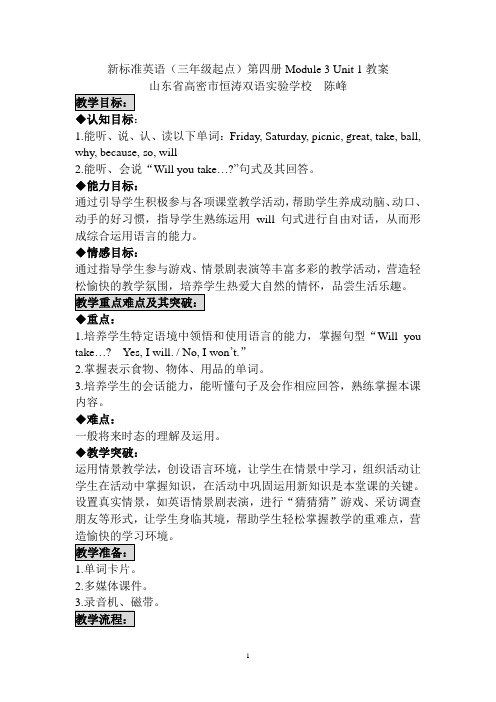
新标准英语(三年级起点)第四册Module 3 Unit 1教案山东省高密市恒涛双语实验学校陈峰◆认知目标:1.能听、说、认、读以下单词:Friday, Saturday, picnic, great, take, ball, why, because, so, will2.能听、会说“Will you take…?”句式及其回答。
◆能力目标:通过引导学生积极参与各项课堂教学活动,帮助学生养成动脑、动口、动手的好习惯,指导学生熟练运用will 句式进行自由对话,从而形成综合运用语言的能力。
◆情感目标:通过指导学生参与游戏、情景剧表演等丰富多彩的教学活动,营造轻松愉快的教学氛围,培养学生热爱大自然的情怀,品尝生活乐趣。
◆重点:1.培养学生特定语境中领悟和使用语言的能力,掌握句型“Will you take…? Yes, I will. / No, I won’t.”2.掌握表示食物、物体、用品的单词。
3.培养学生的会话能力,能听懂句子及会作相应回答,熟练掌握本课内容。
◆难点:一般将来时态的理解及运用。
◆教学突破:运用情景教学法,创设语言环境,让学生在情景中学习,组织活动让学生在活动中掌握知识,在活动中巩固运用新知识是本堂课的关键。
设置真实情景,如英语情景剧表演,进行“猜猜猜”游戏、采访调查朋友等形式,让学生身临其境,帮助学生轻松掌握教学的重难点,营造愉快的学习环境。
1.单词卡片。
2.多媒体课件。
I、Greetings:T: Good morning, boys and girls.Ss: Good morning, Mr Chen.师生互致问候。
II、Warming-up:1.Boys and girls, let’s sing the song “London Bridge is falling down”and do the actions. OK? Let’s begin!百度音乐盒(歌曲London Bridge is falling down)/m?word=mp3,,,[london+bridge+is+fallin g+down]&cat=0&gate=1&ct=134217728&tn=baidumt,london+bridge+is +falling+down++&si=london+bridge+is+falling+down;;twins;;44342;;44 342&lm=-1&mtid=5&d=7&size=1048576&attr=0,0&titlekey=31172641 1,190899277边唱边做动作。
新标准第四册课后题答案
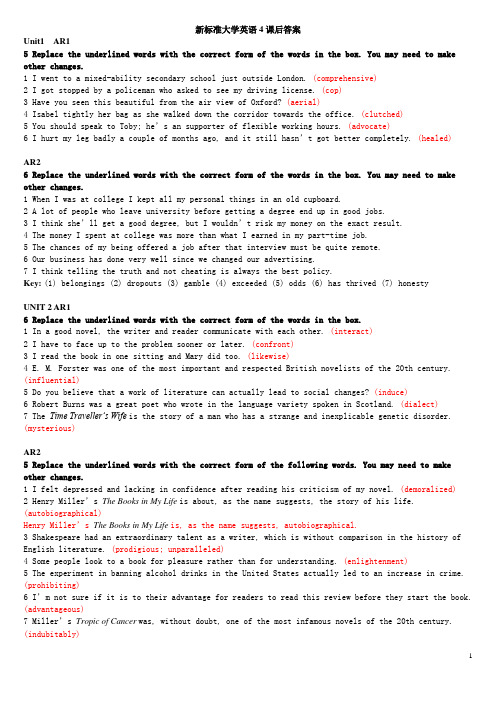
新标准大学英语4课后答案Unit1 AR15 Replace the underlined words with the correct form of the words in the box. You may need to make other changes.1 I went to a mixed-ability secondary school just outside London. (comprehensive)2 I got stopped by a policeman who asked to see my driving license. (cop)3 Have you seen this beautiful from the air view of Oxford? (aerial)4 Isabel tightly her bag as she walked down the corridor towards the office. (clutched)5 You should speak to Toby; he’s an supporter of flexible wor king hours. (advocate)6 I hurt my leg badly a couple of months ago, and it still hasn’t got better completely. (healed)AR26 Replace the underlined words with the correct form of the words in the box. You may need to make other changes.1 When I was at college I kept all my personal things in an old cupboard.2 A lot of people who leave university before getting a degree end up in good jobs.3 I think she’ll get a good degree, but I wouldn’t risk my money on the exact result.4 The money I spent at college was more than what I earned in my part-time job.5 The chances of my being offered a job after that interview must be quite remote.6 Our business has done very well since we changed our advertising.7 I think telling the truth and not cheating is always the best policy.Key: (1) belongings (2) dropouts (3) gamble (4) exceeded (5) odds (6) has thrived (7) honestyUNIT 2 AR16 Replace the underlined words with the correct form of the words in the box.1 In a good novel, the writer and reader communicate with each other. (interact)2 I have to face up to the problem sooner or later. (confront)3 I read the book in one sitting and Mary did too. (likewise)4 E. M. Forster was one of the most important and respected British novelists of the 20th century. (influential)5 Do you believe that a work of literature can actually lead to social changes? (induce)6 Robert Burns was a great poet who wrote in the language variety spoken in Scotland. (dialect)7 The Time Traveller’s Wife is the story of a man who has a strange and inexplicable genetic disorder. (mysterious)AR25 Replace the underlined words with the correct form of the following words. You may need to make other changes.1 I felt depressed and lacking in confidence after reading his criticism of my novel. (demoralized)2 Henry Miller’s The Books in My Life is about, as the name suggests, the story of his life. (autobiographical)Henry Miller’s The Books in My Life is, as the name suggests, autobiographical.3 Shakespeare had an extraordinary talent as a writer, which is without comparison in the history of English literature. (prodigious; unparalleled)4 Some people look to a book for pleasure rather than for understanding. (enlightenment)5 The experiment in banning alcohol drinks in the United States actually led to an increase in crime. (prohibiting)6 I’m not sure if it is to their advantage for readers to read this review before they start the book. (advantageous)7 Miller’s Tropic of Cancer was, without doubt, one of the most infamous novels of the 20th century. (indubitably)UNIT 4 AR16 Replace the underlined words with the correct form of the words in the box.1 My car is very inexpensive to run – it uses LPG instead of petrol. (economical)2 When I saw Brian in his new sports car I felt a bit unh appy that he had something which I didn’t have. (jealous)3 Our relationship is not serious or deep; we just say hello to each other when we meet, and that’s it. (superficial)4 You’re likely to have a lot of repayments to make if you go on spending like t hat. (liable)5 I like this coffee. It has a rather different and easy-to-recognize taste. (distinctive)6 We have exchanged a number of letters about the best way to pay back the debt. (correspondence)7 The important thing is to exercise some self-control when using a credit card. (restraint)8 It reminds me of that lovely story about the evil giant who turns out to be afraid of his own shadow. (delightful; wicked)UNIT 5 AR17 Replace the underlined words with the correct form of the following words. You may need to make other changes.1 Cultural and intellectual programs tend to be broadcast very late in the evening. (highbrow)2 At the beginning I was very shy, but I soon got to know everyone and made friends. (initially)3 The course I enjoyed most when I was studying linguistics was the one on the relationship between words and meanings. (semantics)4 To find out more about English as a world language, we need reliable people who are able to give information. (informants)5 She sent me a bunch of roses when I got the job, and I did the same when she got promoted. (reciprocated)6 For some men there is still a feeling of embarrassment and unease about taking orders from a female superior. (stigma)7 After the goal was disallowed, most of the words I could hear were swear words. (expletives)8 You can’t speak like that to someone you don’t know. It’s a matter of rules of social behaviour. (etiquette)9 Only after a very careful and time-consuming editing will this book be ready for publication. (exhaustive)AR27 Replace the underlined words with the correct form of the following words. You may need to make other changes.1 Don’t forget to put on a bit of lipstick and mascara before you go out. (make-up)2 The candidate displayed a lack of seriousness which we felt was not appropriate to the position he was applying for. (frivolousness)3 I need to check my free dates in March before I can confirm whether I shall be able to attend the conference. (availability)4 He has an attractive smile which people find hard to resist. (alluring)5 This list of participants needs to be put into alphabetical order. (alphabetized)6 The first person officially suggested as general secretary had to withdraw due to ill health. (nominee)7 After the first remarks offering congratulations the atmosphere at the prize-giving ceremony turned sour. (congratulatory)8 The speaker made a comment which I found unfriendly and which meant the opposite of what he really meant. (sarcastic)UNIT 6 AR18 Replace the underlined words with the correct form of the words and expressions in the box.1 His achievements were so great that they can never be bettered. (surpassed)2 The situation can only get worse; it will never improve. (degenerate)3 Although he was a rich man, his clothes were of poor quality and in bad condition. (shabby)4 He exchanged his position as a general for that of an ordinary soldier. (swapped)5 At the beginning of World War II the King turned to Churchill to lead the country. (onset)6 Churchill drank a lot of alcohol. (liquor)7 Churchill wanted to do something to show he was sorry for his mistake at the battle of Gallipoli. (make amends)UNIT 7 AR17 Replace the underlined words with the correct form of the words in the box.1 The two buildings looked exactly the same from the outside, but were very different inside. (identical)2 When spring arrives the garden is full of flowers on the trees. (blossoms)3 The postman used to bring the mail in a large group of things tied together, but these days, we only get the occasional letter. (bundle)4 She felt suddenly unconscious for a short time when she heard the dreadful news. (fainted)5 At the place where two or more roads meet, there are often queues of traffic. (crossroad)6 I sometimes feel unhappy and angry at the noise and traffic, but most of the time I ignore them. (resent)7 When you leave apples on the ground, they are gradually destroyed by a natural process, and can’t be collected and stored. (decay)UNIT9 AR16. Replace the underlined words with the correct form of the words in the box. You may need to make other changes.1 One of the most frustrating parts of learning a foreign language is feeling stupid when you can’t understand something. (dumb)2 I have to admit that English spelling is difficult for foreigners to understand. (concede)3 After I accidentally spilt tea on my painting, the picture was a shape that was difficult to see clearly. (blurred)4 I need to read and learn again the vocabulary before the next lesson. (revise)5 I have a hard time with PowerPoint slides sometimes because it’s difficult for me to manage to control and arrange both text and images. (manipulate)6 I don’t think you stop learning when you leave university. Learning should be a continuous process throughout your life. (ongoing)7 It’s difficult to learn listening and speaking as separate skills. To be good at one, you should work on both. (isolated)8 During my speech, I made a terrible and embarrassing mistake when I mispronounced an important word. (disgraceful)AR25. Replace the underlined words with the correct form of the words in the box.1 It is difficult to imagine how much slower communication was during the time period of the telegraph.2 He worked hard to argue against my claim, but I knew I had the truth on my side.3 The manager is supposedly responsible for losing nearly eight per cent of this year’s profits.4 I was proud to have my article accepted for publication in one of the leading scientific monthly publications.1. epoch2. refute3. allegedly4.journals。
新标准综合英语第四册languageinusetranlation答案
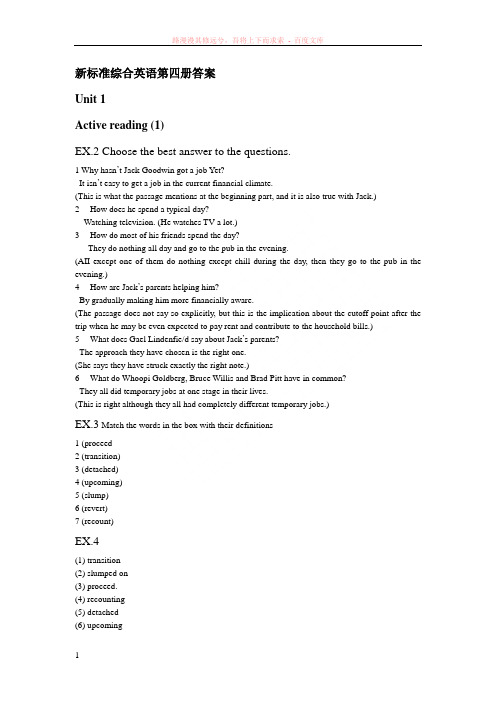
新标准综合英语第四册答案Unit 1Active reading (1)EX.2 Choose the best answer to the questions.1 Why hasn’t Jack Goodwin got a job Yet?It isn’t easy to get a job in the current financial climate.(This is what the passage mentions at the beginning part, and it is also true with Jack.)2How does he spend a typical day?Watching television. (He watches TV a lot.)3How do most of his friends spend the day?They do nothing all day and go to the pub in the evening.(AII except one of them do nothing except chill during the day, then they go to the pub in the evening.)4How are Jack’s parents helping him?By gradually making him more financially aware.(The passage does not say so explicitly, but this is the implication about the cutoff point after the trip when he may be even expected to pay rent and contribute to the household bills.)5What does Gael Lindenfie/d say about Jack’s parents?The approach they have chosen is the right one.(She says they have struck exactly the right note.)6What do Whoopi Goldberg, Bruce Willis and Brad Pitt have in common?They all did temporary jobs at one stage in their lives.(This is right although they all had completely different temporary jobs.)EX.3 Match the words in the box with their definitions1 (proceed2 (transition)3 (detached)4 (upcoming)5 (slump)6 (revert)7 (recount)EX.4(1) transition(2) slumped on(3) proceed.(4) recounting(5) detached(6) upcomingEX.51 (comprehensive)2 (cop)3 (aerial)Have you seen this beautiful aerial view of Oxford?4 (clutched)5 (advocate)You should speak to Toby; he’s an advocate of flexible working hours.6 (healed)EX.61 (b) no future?2 (a) difficult,3 (a) tired,4 (a) persuade you to do something you don’t want to, or5 (b) stay at home and do nothing?EX.71 (b) an informal2 (b)in the same difficult or unpleasant situation?3 (a) feel you are back where you started,4 (a) in a kind and sympathetic way,5 (a) well,6 (a) try your best to do it,7 (a) take responsibility again,8 (a) examine it carefully and sensitively,Active reading (2)EX.2 Choose the best answer to the questions.1 (a) To do an MA at the London School of Economics.2 She had the idea when she saw the landlord working.3 A bunch of nowers.4 He tnisted her and thought it would help her.5 She invested it and paid back Tony and other investors.6 It proved that he had been right to invest in her.EX.4 Match the words in the box with their definitions.1 (amusing)2 (fortunately)3 (loan)4 (deduct)6 (sympathize)7 (demanding)EX.5 Complete the conversation with the correct form of the words in Activity 4.(1) sympathize(2)fortunately(3) loan(4) demanding.(5) amusing(6) highlight(7) deductedEX.61 (belongings)2 (dropouts)3 (gamble)4 (exceeded)5 (odds)6 (thriving)Our business has been thriving since we changed our advertising.7 (honesty)EX.7 Answer the questions about the words and expressions.1 (b) just a little bit disappointing?2 (b) bored by3 (a) stressed,4 (a) unexpected,5 (b) it happened almost by chance?6 (a) the customers who come very often,7 (a) very easy,8 (a) buy something nice for them,9 (a) make the place look brighter,EX.8 Look at the sentences from the passage and identify the style features.1 This shows the informality of an incomplete sentence in the first part, the use of an informal expression (banging on about) and a thetorical question to the reader (what do I find?).2 This has the use of an informal word (hassle), an informal exclamation (god) and a question to the reader (when will they grow up?).3 Here is a discourse marker typical of speech (actually) and an informal phrase (had my eye on).4 Here kind of is a discourse marker of informal speech, showing something is general, vague or not definite.5 This has a discourse marker of informal speech (you know).6 Again here is a discourse marker of informal speech (it s true).7 This has another discourse marker of informal speech (well) and an informal expression (pretty well).Language in useEX.1 Write the compound nouns which mean:1 (a first-class degree)2 (hospital work)3 (a plane ticket)4 (a student discount)5 (a bus pass)6 (an interview room)7 (a training period)EX.2 Write the noun phrases which mean:1 (a financially rewarding career)2 (recently introduced legislation)3 (unusually complex instructions)4 (an academically orientated institution)5 (physically demanding work)6 (potentially important information)7 (carefully selected candidates)8 (a beautiflly planned coursebook)EX.3 Rewrite the sentences using try as ..- might.1 Try as I might to fill this last page, I just can’t think of anything.2 Try as I might to be friendly with Marta, she doesn’t seem to respond.3 Try as I might to get to sleep, I can’t help thinking about my family.4 Keep trying as he might, he just doesn’t seem io get the promotion he deserves. / Keep trying as he might to get the promotion he deserves, he just doesn’t seem to get it.5 Keep trying as I might to remember her name, my mind is a blank.EX.4 Rewrite the sentences using given that …1 Given that I know several languages, I thought I would look for work abroad.2 Given that Xiao Li has the best qualifications, she should get the job.3 Given that we’re all here, I think it would be a good idea to get down to some work.4 Given that it’s rather late, I think we should leave this last task until tomorrow.EX.5 Rewrite the sentences using clauses introduced by than.1 I’m more experienced at giving advice than is she.2 You eat too more chocolate than is good for you.3 She worked harder than do most part-timers.4 You have arrived late too more times than is acceptable.5 I think you have given more personal information than is wise.EX.7 Translate the paragraphs into Chinese依我看,现实生活并没有人们想象的那么好。
新标准大学英语4原文
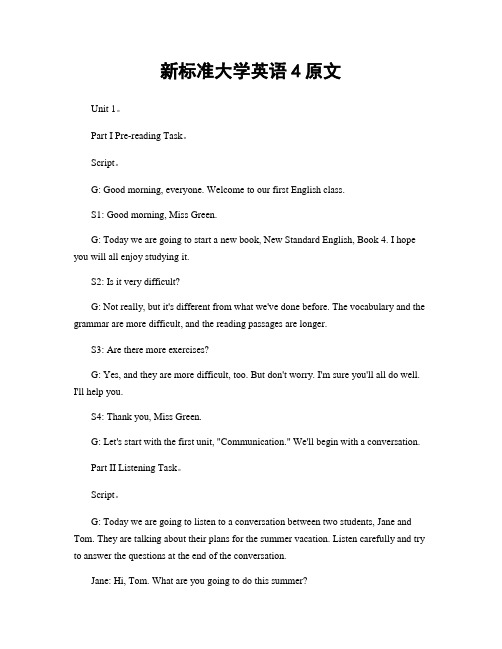
新标准大学英语4原文Unit 1。
Part I Pre-reading Task。
Script。
G: Good morning, everyone. Welcome to our first English class.S1: Good morning, Miss Green.G: Today we are going to start a new book, New Standard English, Book 4. I hope you will all enjoy studying it.S2: Is it very difficult?G: Not really, but it's different from what we've done before. The vocabulary and the grammar are more difficult, and the reading passages are longer.S3: Are there more exercises?G: Yes, and they are more difficult, too. But don't worry. I'm sure you'll all do well. I'll help you.S4: Thank you, Miss Green.G: Let's start with the first unit, "Communication." We'll begin with a conversation.Part II Listening Task。
Script。
G: Today we are going to listen to a conversation between two students, Jane and Tom. They are talking about their plans for the summer vacation. Listen carefully and try to answer the questions at the end of the conversation.Jane: Hi, Tom. What are you going to do this summer?Tom: Hi, Jane. I'm going to visit my uncle in Canada. He lives in Toronto. Jane: That sounds great. I'm going to visit my aunt in New York.Tom: Really? When are you leaving?Jane: I'm leaving next week. How about you?Tom: I'm leaving in two weeks. I can't wait to see my uncle.Jane: Me too. I miss my aunt so much.Tom: Have you been to New York before?Jane: No, it's my first time. I'm really excited.Tom: You'll love it. There's so much to see and do.Jane: I can't wait. I've heard so much about it.Tom: Well, have a great time. I'll see you when we get back.Jane: You too. Have a safe trip.Part III Language Points。
新标准大学英语第四册 unit 7 active reading 1 课文及译文
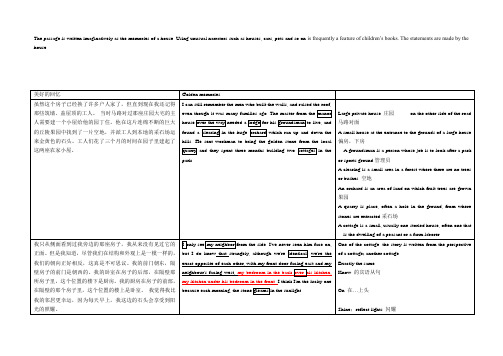
A clearing is a small area in a forest where there are no trees or bushes 空地
ቤተ መጻሕፍቲ ባይዱ
An orchard is an area of land on which fruit trees are grown 果园
A quarry is place, often a hole in the ground, from where stones are extracted 采石场
Large private house 庄园 马路对面
on the other side of the road
A small house at the entrance to the grounds of a large house 偏房,下房
A groundsman is a person whose job is to look after a park or sports ground 管理员
也很听话。 他们会静静地在屋里或花园里一起玩耍。渐渐地, played quietly together inside or in the garden, and gradually grew
他们长大了,也长高了。 最让我感到愉快的一个记忆是:在 older and taller. One of my happiest memories is of one warm
Golden memories I can still remember the men who built the walls, and raised the roof, even though it was many families ago. The master from the manor house over the way needed a lodge for his groundsman to live, and found a clearing in the huge orchard which ran up and down the hills. He sent workman to bring the golden stone from the local quarry and they spent three months building two cottages in the park.
新标准小学英语第四册全册教案1

新标准小学英语第四册全册教案1Module 1 Friends Unit 1 she鈥檚a nice teacher. Teaching objectives: 1. Words and phrases: nice \ a bit \ shy \ clever \ naughty 2. Sentences: This is Ms Smart. She is a nice teacher. 3. Grammar: Using adjectives to describe person. Teaching properties: cards \ pictures \ photo \ Tape-recorder \ CAI Teaching procedures: A: Song: There are twelve months in the year. B: Free talk: Talk about your holiday. C: New concepts: Step one: One :鍒╃敤CAI璇句欢,ice \ a bit \ shy \clever \ naughty 柊鍗曡瘝銆?Two: Learn the new lesson. Listen to the tape .Try to read the text. Translate the sentences. Listen to the tape again, read follow the tape. Read the text, boys and girls. Step Two: Talk about the pictures. Close your books, show the pictures (parrot锛?Xiaoyong锛?Maomao锛?Ms Smart) Example :( 1) This is Parrot. Parrot is a very naughty bird. (2) This is Xiaoyong . He鈥檚a clever pupil. Step Three: Using adjectives to describe person. 鍒╃敤瀹炵墿鎶曞奖灞曠ず瀛︾敓甯︽潵鐨勭収鐗囥€?Describe the person using the adjectives Homework: Introduce your classmates to your family. Example: This is Xiaoyong. He鈥檚a clever pupil. Game: 鎺ラ緳娓告垙Example: A: I鈥檓XiaoLan. I鈥檓a bit shy. B: XiaoLan is a bit shy. I鈥檓ZhangYong. I鈥檓very nayghty. C: ZhangYong is very naughty. I鈥檓Jim, I鈥檓a nice boy. 鈥?Designs: Module One: FriendsModule 1 Friends Unit 2 He鈥檚cool.Teaching objectives: 1. Words and phrases: cool \ little \ cute. 2. Sentences: This is this is my big brother, He鈥檚cool. Teaching properties: cards \ Tape-recorder \ CAI Teaching procedures: A: Song: Row Row Row your boat. B: Free talk: Using adjectives to describe the poem. C: New concepts: Step one: Warmer: Using the adjectives todescribe your classmates. Example: 鈶?This is Xiaoyong. He is a clever pupil.鈶?This is Yuanjiaqi. She鈥檚very clever, but she鈥檚 a bit shy. Step Two: Listen and point. (1) Point out the different meanings of the word 鈥渃ool鈥? In this unit, 鈥渃ool鈥?means fashionable, and it is most commonly used to mean 鈥渜uite cold鈥? The word 鈥渃ool鈥?has other meanings as well, but they are ones that the students are unlikely to come across in the future. (2) Listen to the tape and underline the new words. Write down these adjectives on the board, and then learn these new words. Listen to the tape again. Read the text. Close your book. Use CAI shows the pictures of text. Choose some students to describe the pictures. Step Three: Listen and say, then say the poem and do the actions. Play the spoken version of the poem. And have the students. Repeat each line. Play the tape and have the students. Step four: Tell the students that they are going to work in groups of three or four. Do the AB unit 2. Homework: Choose some words to write about your friend. Example: This is my friend脳脳脳. She is a clever pupil. At school, she鈥檚a bit shy, but at home, she is very naughty girl. Game: Explain that they are going to play a game where they have to whisper some information to their classmate. That classmate has to whisper the information to the next person. The last person. That person has to say that he \she heard. Then, the other students listen carefully to find out if the message has changed at all. Designs: Unit 2 He鈥檚cool. mother --- nice big brother --- cool little sister --- cute father --- clever friend --- naughtyModule 2 London Unit 1 London is the capital of England. Teaching objectives: 1銆乄ords and phrases: capital, about, beautiful, be from 2銆丼entences: I鈥檓from London. London is the capital of England. It鈥檚very big and very beautiful. 3銆丟rammar: the present tense Teaching properties: cards, pictures, tape鈥時ecorder Teaching procedures: A: Chant: This is a little girl, and she has a little curl. And when she is good, she is very, very good. And when she is bad, she is very, very bad! B: Talk Free: T: Hello! Boys and girls. I鈥檓a teacher. Are you a teacher? S1: No, I鈥檓not.S2: No, I鈥檓a pupil. T: Are you naughty? S3: No, I鈥檓not. T: Are you clever? S4: Yes, I am. 鈥︹€?杩颁汉鐗╂€ф牸鐨勫崟璇嶏細naughty, shy, clever, nice, cool.锛?C: New concepts: Step ?鍒╃敤鍗$墖鏁欐巿鈥渃apital鈥濓紝ondon is the capital of England.鈥濅腑銆俆hen translate it into Chinese.?Step 浜屻€佹柊鎺?my 鍜孡ingling Amyinglingmy 鍚戝ス浠嬬粛浼︽暒鐨勬儏鍐Amy 瀛︿竴瀛︽€庢牱鎻忚堪鍩庡競鍜屾櫙鐗┿€?у?my鍜?Lingling here is London?鈥?鐢熷湪鍦板浘涓婃寚鍑轰鸡鏁︾殑浣嶇疆銆??锛坣ice, big, beautiful, small锛夈€?傗€渂eautifulц?Step 涓夈€佺粌涔?瀹屾垚SB厓娲诲姩3銆?Amy 鍜?Lingling 锛岃繘琛岄棶绛旂粌涔犮€??銆丄: What鈥檚this? B: It鈥檚 a book about London. It鈥檚very nice. 2銆丄: What鈥檚the capital of England? B: It鈥檚London. Step 鍥涖€佷綔涓?瀹屾垚娲诲姩鐢ㄤ功缁冧範1鍒扮粌涔?銆? Designs:Xk b 1.c om Module 2 London Unit 2 This is the River Thames Teaching objectives: 1銆乄ords and phrases: long, wide, many, river, old, famous 2銆丼entences: This is the River Thames. It鈥檚long and wide. 3銆丟rammar: Using adjectives to describe cities and buildings. Teaching properties: cards (pictures), tape鈥時ecorder, CAI Teaching procedures: A: Song: Chant: This is a little girl. B: Talk about: Using adjectives to describe a person鈥檚personality and London. C: New concepts: Step 涓€銆?Warmer: Revise adjectives. Tell the students that I am going to say an adjective. They have to find something in their books that the adjective describes. Ask two or three students to say which object the chose. Example锛?T: It鈥檚big. S1: (points to London) London. S2: (points to elephant) Elephant. S3: (points to Beijing) Beijing. Do more examples with the class. Step 浜屻€丩isten, point and say: 1銆丩isten, point and find out the new words and underlime them. Then revise them using cards or pictures. (Write down these words on the board.) 2銆丄fter doing this, tell the students to close their books. I am going to say the first word of a two-word place name. These places are all in London. The students have to say the second word of the two-word name. Example: T: Buckingham鈥?Ss: alace. T: Hyde鈥?Ss:ark. 3銆丠ave the students continue the activity in pairs. They should take turn to say the first word. 4銆丼howing four pictures on the screen about "the River Thames", "Big Ben", "Hyde Park", and "Tower Bridge". (Write down these words.) The same time, I am going to read the text for the students. Have them remember the sentences. The second times, ask some students to introduce the pictures. 5銆丟ames: Guessing game. 6銆丏o AB Unit 2 exercise 1. Quiz: Listen and say the answers. 7銆丼howing AB Unit2 exercise 2 on the screen. Do this exercise together. Step 涓夈€?Practice 1銆丏o SB Unit2 activity 4. Listen and point. First, have students say something about these pictures. Then listen and guess which one is right. 2銆丏o AB Unit2 exercise 4. Write about your school building. Step 鍥涖€?Learn to sing 1銆丠ave the students look at the picture and describe it (children playing a game). 2銆乀ell the students that this song, 'London Bridge is falling down' is a traditional English song. Explain that London Bridge is a very famous bridge in London. 3銆丳lay the spoken version of the song and have the students repeat each line. Play the tape and have the students sing the song. 4銆丒xplain the actions and have the class sing the song again. Choose some students to come to the front and play it. Let's see "Who is the winner?" Have the students sing and do the actions after class. Step 浜斻€?Homework Make a survey to compare London and My hometown. You can using "This is t's (very)鈥? and the other sentences to introduce.London My Hometown Country Language Big/Small 鈥?Games: 1銆丟uessing game Tell the students that I am going to say adjectives and they have to think of some places in China that these adjectives describe. Example T: Old. S1: Great Wall. S2: Palace Museum. Designs:Module 3 Picnic Unit 1 Will you take your kite锛?Teaching objectives锛? words and phrase锛歱icnic take great ball why beacause so 2 Sentence锛?We鈥檙e going to have a picinic Will you take your kite锛?Yes锛孖will./No, I won鈥檛. 3 Grammar: Talk about plan Teaching properties: picture CAI Tape Teaching procedures: A: Songs: London Bridge Following Down B: Free talk: Our school C: New concepts: Step1: Warmer: Teacher show some pictures about the 鈥淗yde Park River Thames鈥?S1: This is Big Ben. It鈥檚very old and very beautiful. S1: This is Hyde Park. It鈥檚very beautiful. S3: ... Step2: Listen and point. T: It鈥檚a ball. (Show the ball) I鈥檓going to play ball. Will you play with me? S2: Yes, I will. T: I鈥檓going to go to Hainain. Will you take a ball? (鍚屾椂鏉夸功) S2锛歂o锛孖won't. Step3: Teacher shows the cards about the new words. Students follow the teacher .The students read oneby one .I play the tape and the students follow the recorder. S1: Will you go to Huanren tomorrow? S2: Yes, I will. S3: Tomorrow we鈥檙e going to have a Music lesson. S4: No, I won鈥檛. Will鍜実oing to 鐨勭敤娉曡瘎鍑烘渶濂界殑涓€缁勩€?Game锛欰锛?Two students play a game 锛嶵hey choose one food or one object and do the action. S1: Will you take some noodles? S2: No, I won鈥檛. S1: Will you take a cake? S2: Yes, I will. B: Four students look some pictures and tale about. A: We鈥檙e going to go to Hainan tomorrow. I will take my coat and my hat. Will you take your swimsuit? 锛堢敤CAI锛?B: No, I won鈥檛. I鈥檒l take my coat, too. Will you take your gloves? C: YES, I Will鈥?D: 璇勫嚭鏈€浣充竴缁勭粰sticker Slep5: Do homework and exercise. Design: Module 3 Picnic 1 Will you take your kite? take We are going to have a picnic.picnic Will you take your kite? great ball Yes, I will. / No, I won鈥檛. why because so . Module 3 Picnic Unit 2 On Monday I鈥檒l go swimming. Content: Module 3 Unit 2 On Monday I鈥檒l go swimming. Function: Talk about the plan of seven days in a week. Teaching points: 1.Words and phrases: homework, help, Monday, Tuesday, Wednesday, Thursday, Friday, Saturday, Sunday 2. Sentences: On Monday I鈥檒l go swimming. Will you play football on Monday? Yes, I will.../No, I won鈥檛. Teaching properties: tape recorder, cards, pictures Teaching procedures: 1. Warming up Write the numbers1-7on the board. Write the words Monday to Sunday under the numbers. Have them predict the meaning of the words, Monday, Tuesday and so on. Point to the words and say them. Have the students repeat them. Now tell the students that you are going to say a day and they have to use an ordinal number and say which day is it. 2. Now point ,ask and answer Have the students suggest activities that they do and write a list on the board .e.g. play football, ride a bike, go swimming, read a book, watch TV, go to the cinema, go to school, walk in the park, play with a friend, do homework. Then draw the following calendar on the board: Monday Tuesday Wednesday Thursday Friday Saturday Sunday Have the students copy thecalendar in their exercise book .They should write activities on the calendar. Then have the students work in pairs and tell one another what they will do on the seven day of the week. e.g.S1: On Monday I will watch TV. S2: I will do my homework on Monday. 3. Listen and say ,then sing and clap Before singing the song Have the students look the picture and say what type of song this is. Have the children say the names of any clapping songs or games they know. Then act. While singing the song Play the tape and let the student listen to the melody. Then play the spoken version of the song and have the students repeat the line. Divide the students into seven groups. Asking each group a day of the week respectively. Have the students in each group write their day on a piece of paper. Explin that they must hold up their day of the week as they sing that word in the song, now have the class sing the song. 4. Homework ?5. Design xk b 1.c om Module 3 Unit2 On Monday I鈥檒l go swimming homework 瀹跺涵浣滀笟help Monday 鏄熸湡涓€Tuesday 鏄熸湡浜?Wednesday 鏄熸湡涓?Thursday 鏄熸湡鍥?Friday 鏄熸湡浜?Saturday 鏄熸湡鍏?Sunday 鏄熸湡鏃?6. RetrospectionModule 4 Robots Unit 1 Robots will do everything.Function: Describing things in the future and talking about abilities Teaching points: 1.Sentences: One day, robots will do everything. 2. Words and phrases: robot everything one day housework learn our that 3. Using will to describe things in the future Teaching properties: cards tape-recorder CAI Teaching procedures: (1) Warming up: ---Greeting. ---Listen and act : e.g. wash clothes watch TV run walk play the flute play football jump do homework make a cake row a boat play table tennis (will 鐨勫? (2) Presentation: Show a robot to the class and say 鈥淭oday we鈥檙e going to talk about the robots.鈥?Describing the robots, it can sing. It candance. One day, robots will do everything. (杩愮敤鍥剧墖灞曠ずrobot鐨勫惈涔? Ask to the students 鈥淲hat else will the robots do?鈥?Show the CAI to students. (В鏈哄櫒浜鸿兘鍋氫粈涔堜笉鑳藉仛浠€涔? Now show the text to the students. Look at the book and ask. What can Daming鈥檚robot do? Will robots do the housework? Will robots help children learn?... Write the answers on the board: It can walk. Then drill this sentence and then change the word 鈥渨alk鈥? Talk about the sentences: They will do the housework. They will help children learn. Write the sentence on the board One day, robots will do everything. (ne day鐨勫惈涔? Continue the words learning: housework help children learn鈥?In groups, talk about the robots then report. (3) Practice: Do exercises in AB. In pairs act the text. Draw a robot and say what the robot can do .In pairs or in groups then report. (4) Production: Look at Exercise 3 in the book and talk about what the robots will do in the future. Game: Guess what their robots will do. Then act.級(5)Sum: (6)Homework: Draw a robot and describe it. Using This is________________. It can __________________. It will __________________. Design: Module 4 Robots Unit 1 Robots will do everything. robotIt can walk. One day, robots will do everything. Retrospection:Module 4 Robots Unit 2 Will it be windy in Beijing?Function: Describing weather in the future and talking about weather. Teaching points: 1. Words: weather hot cold sunny snow rain windy 2. Sentences: Will it be windy in Beijing? Yes, it will. / No锛?it won't. 3. Using 鈥渨ill鈥?to describe weather in the future. Teaching properties: cards tape-recorder CAI Teaching procedures: (1) Warming up: Look say and act: hot cold rain sunny snow windy (澶嶄锛?(2) Presentation: Show a map pf China. Write city鈥檚name on the map. Show the cards of weather to students. And listen to the tape then point to the pictures. Draw the simple pictures on the board. And write the words. Learn the words and draw the pictures in the exercise books. (鍚屾椂璁茶Вrain涓?rainy 鐨勫尯鍒? Show the robot to the students and say 鈥淭he robots will do everything. So the robots will broadcast the weather, too. Now let鈥檚act. Listen again and repeat the text then act (冨彞鍨? Show CAI to students. (鐨勯噸鐐瑰彞瀛愶紝鏉夸功鍙ュ瓙銆? (3) Practice: Game: Listen and stick. Listen to tape and stick the cards on map. 锛?эㄤ竴璧枫€傦級Do this game in groups or in pairs. Do the exercises in AB. (4) Production: Look at the CAI and ask 鈥淲hat will the weather be?鈥?锛堝嚭绀哄悇鈥淲ill it______________? 鈥?In groups or in pairs to continue the game. ( 5 ) Homework : 璋冩煡妗撲粊鏄庡ぉ鐨勫ぉ姘旀儏鍐碉紝鍒舵垚琛ㄦ牸?Design: Module 4 Unit 2 Will it be windy in Beijing? Hot Cold Will it be _______in_________? Sunny Yes, it will. / No, it won鈥檛. Rain Windy snow Retrospection:Module 5 Size Unit 1 Amy锟紷s taller than Lingling.Content: Book 4 Module 5 Size Unit 1 Amy锟紷s taller than Lingling. School: Guaimozi School Teaching objectives: 1锟絧Words and phrases: old\olderyoung\younger strong\stronger than 2锟絧Sentences: Sam锟紷shorter than Lingling. 3锟絧Grammar: Adj. comparison Teaching properties: Pictures锟絧Tape-recorder Teaching procedures: A: song: Monday Tuesday B: Free talk: Talk abouttwo students like this: Lili is fat, Zhaoxin is thin. C: New concepts: (Step 1.)Write the adj. of the students using on the blackboard. (big small fat thin tall short) Then tell students the adj. what we'll learn. Write them on the blackboard: Old Young Strong Learn to read and make sentences like this (Fengqi is strong.\Zhongyao is old.) Then let 2 students stand up, Then say :( Fengqi is strong, Wang kunpeng is stronger.) Write 鈥渆r鈥?behind strong. Students will understand the meaning. Make sentences like this. (Wang kunpeng is stronger than Fengqi.) (Xiaoxiao is younger than Lili.)(Lili is older than Xiaoxiao.) Show out the picture of Amy and Lingling, and handwriting: 鈥淢odule 5 Unit 1 Amy's taller than Lingling.鈥?Show out two bags and let Ss make sentences with (bigger than). Show out two rulers and use (longer than). (Step 2.)A game: Make more sentences about everything. (Eyes hands books and so on.) (Step 3) Practise: (Exercise 1 of Activity Book. Talk about pictures and Ss.) Designs: Module 5 Size Unit 1 Amy's taller than Lingling. ____older bigger____younger than____. Smaller _______stronger fatter thinner taller shorter。
